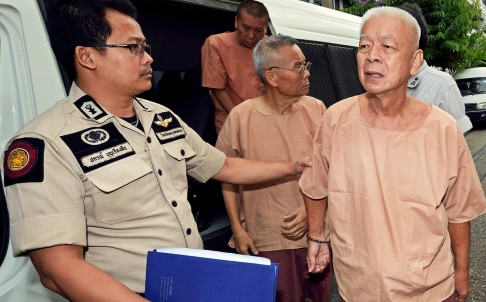- Joined
- Jun 30, 2013
- Messages
- 58
- Points
- 0
Elderly man jailed for 'insult' graffiti
PUBLISHED : Saturday, 21 March, 2015, 3:33am
UPDATED : Saturday, 21 March, 2015, 3:33am
Agence France-Presse in Bangkok

Ophas Chansuksei (right), 67, is escorted by prison guards as he arrives at military court in Bangkok on March 20, 2015. Photo: AFP
An elderly Thai man was jailed for 18 months by a military court for scrawling graffiti in a shopping mall toilet critical of the country's junta leaders and its revered king.
Thailand's monarch Bhumibol Adulyadej, 87, is protected by one of the world's toughest royal defamation rules under which anyone convicted of insulting the king, queen, heir or regent faces up to 15 years in prison on each count.
Ophas Chansuksei, a 67-year-old pin-badge vendor, received the tough sentence for writing anti-monarchy and anti-government messages in an eastern Bangkok mall last October.
The judge described the comments as "false" and said they "lowered the value of the king". His sentence was cut from three years because he pleaded guilty, the judge added. Ophas remained impassive as the sentence was read out.
Speaking after sentencing, Ophas said he was relieved the sentence had been reduced for his guilty plea.
"Soldiers told me when I was detained that if I didn't like someone I should keep it in my heart. I shouldn't have done it," he said.
During the brief hearing the judge read out what Ophas had written on the wall. The majority of his comments were critical of Thailand's junta chief Prayuth Chan-Ocha, who imposed martial law and then seized power in a coup last May. But one sentence made reference to King Bhumibol.
Reporting lèse majesté cases is fraught with difficulty and media must heavily self-censor. Even repeating details of the charges could mean breaking the law under section 112.
Rights groups say basic freedoms have fallen off a cliff since last May's military takeover, following the ousting of Yingluck Shinawatra's democratically elected government, and that draconian lèse majesté legislation is increasingly being used as a tool to stifle opposition.
Under martial law, political gatherings of more than five people are banned, criticism of the junta is outlawed and civilians can be tried in military courts for lèse majesté offences.
